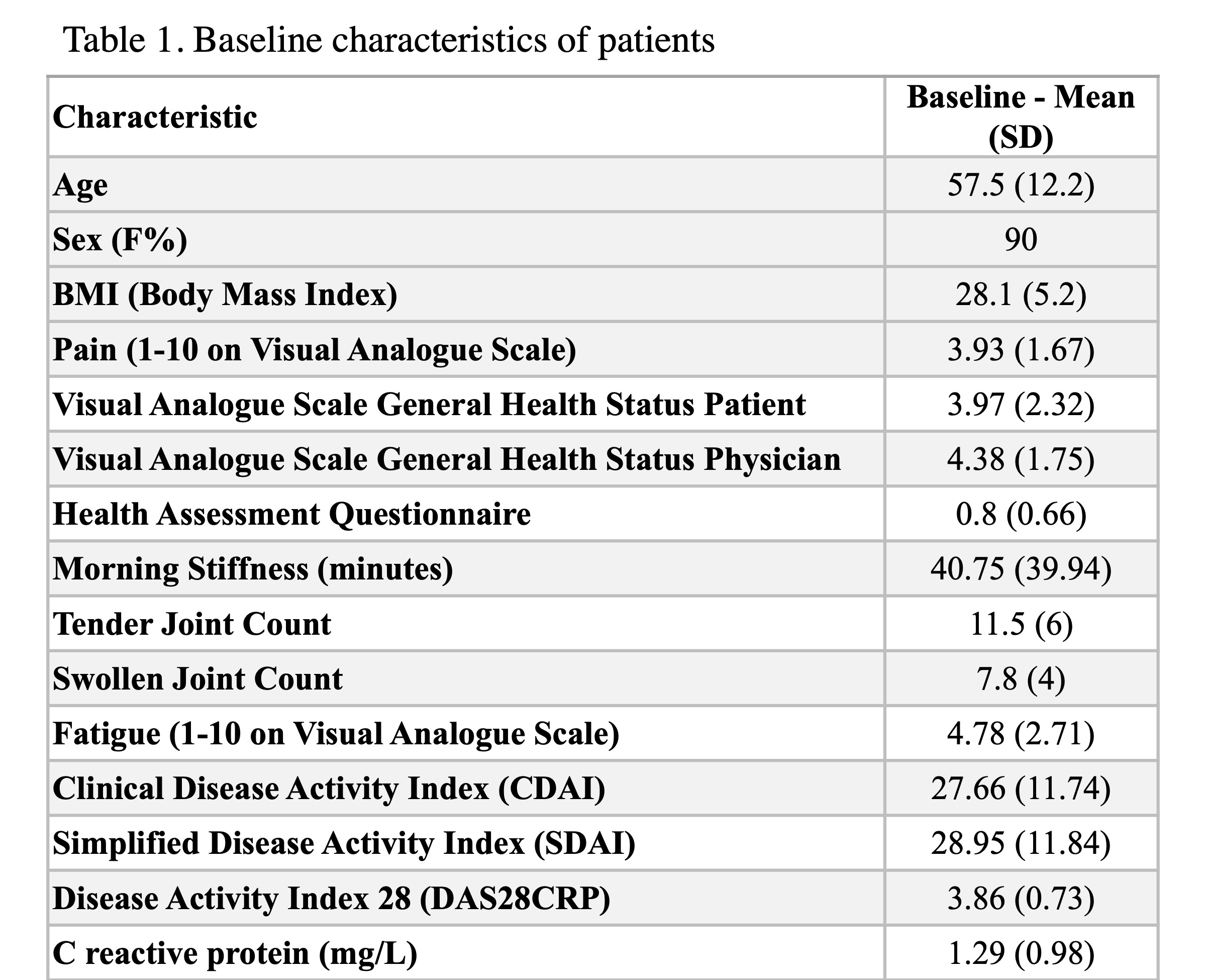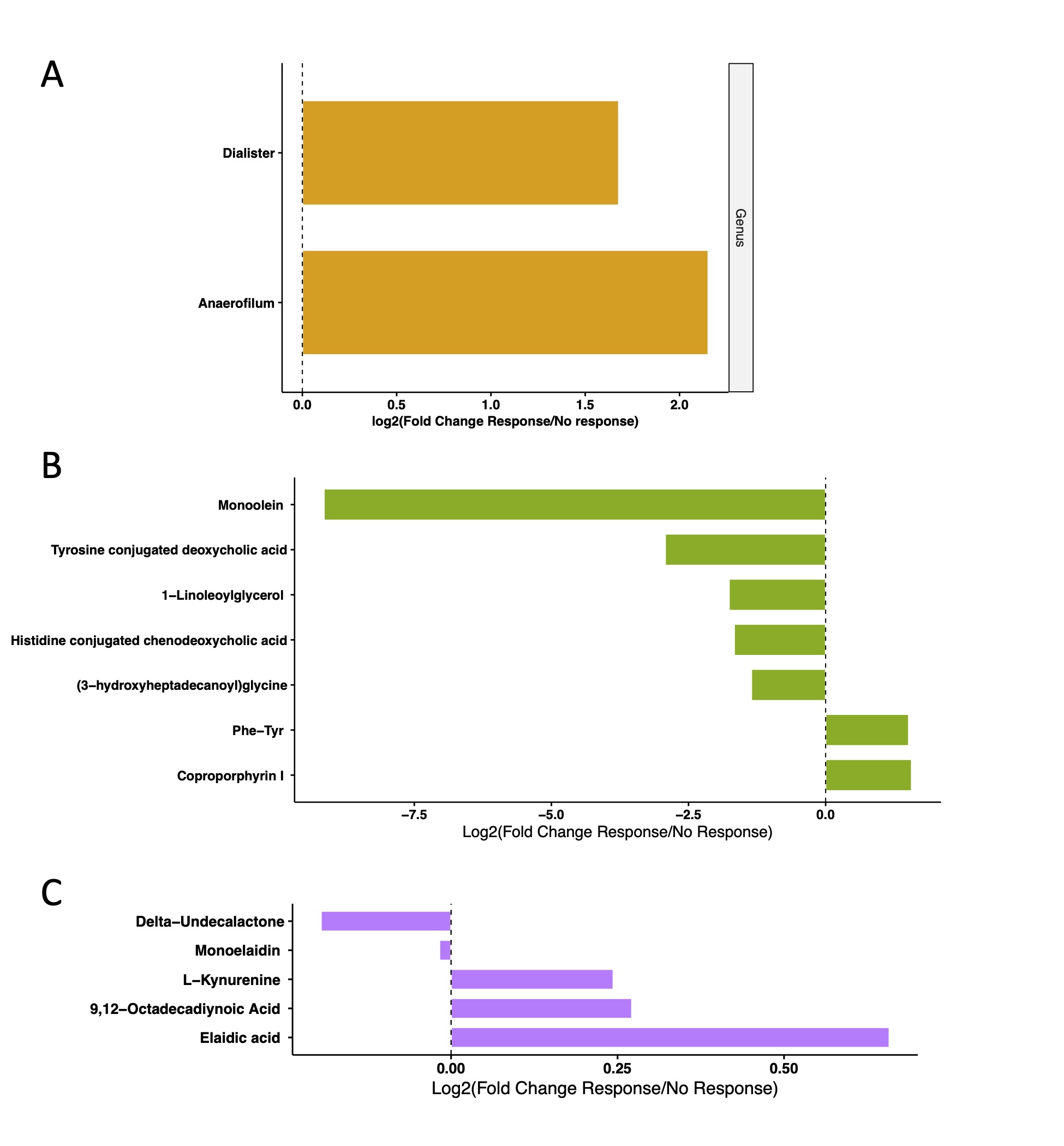Session Information
Date: Tuesday, November 9, 2021
Title: RA – Treatments Poster III: RA Treatments & Their Safety (1674–1710)
Session Type: Poster Session D
Session Time: 8:30AM-10:30AM
Background/Purpose: Fatigue is common symptom in rheumatoid arthritis (RA), associated with decreased quality of life and productivity. Fatigue mechanisms have not been well studied, hence, a poorly understanding of this symptom leads to a poor clinical management. Moreover, despite the high number of drugs available for RA, it can be a persistent symptom despite reaching a low/minimum disease activity.
Methods: We evaluated the effect of diet on fatigue in an open-label pilot trial which had as a main objective the evaluation of feasibility and efficacy of a 2-week anti-inflammatory diet (ITIS) in RA patients. 20 patients with active RA (at least 3 tender and 3 swollen joints) participated. Physical examination and collection of fecal and plasma samples for microbiome and metabolomics were performed, along with collection of data on fatigue on a visual analogue scale from 0 to 10 among other clinical outcomes. 16S rRNA gene amplicon profiling of the stools and untargeted mass spectrometry-based metabolomics in stool and plasma were performed.
Results: Patients had moderate disease activity (DAS28CRP 3.86 ± 0.73) and an average fatigue of 4.78 ± 2.71 (Table 1). Fatigue was more intense in patients with higher disease activity, suggested by the positive correlation between fatigue and DAS28CRP (r=0.5, p=0.02). Post-intervention, fatigue significantly improved from 4.78 ± 2.71 before vs 2.49 ± 2.37 after diet, p < 0.01. Of note, fatigue did not correlate with DAS28CRP after diet (r=0.04, p=0.85). Using a 50% improvement in fatigue, patients were categorized as responders (R, N=9) or non-responders (NR, N=11). At baseline, R microbiome was enriched in Dialister and Anaerofilum, with decreased fecal deoxycholic and chenodeoxycholic acid and increased plasma L-kynurenine, octadecadienoic and elaidic acid (Figure 1). No differences in alpha diversity (within subject) of fecal microbiome and metabolome, nor plasma metabolome, were observed between R and NR before or after the diet. Only plasma metabolome beta-diversity (between subjects) was different between R and NR after the diet (Figure 2A). Post intervention, R microbiome was enriched in Tissierellaceae family and Gemmiger and Anaerofilum genus, while Bacteroides genus was decreased (Figure 2B). R fecal metabolome was enriched in dypeptides (Val-Arg, Leu-Val), Guanine and Hirsutanone (plant derived), which has potential anti-inflammatory properties (Figure 2C). Fecal cis 8,5,11 eicosatrienoic acid and 8-oxo-OTrE, potentially pro-inflammatory, were decreased in R. R also had higher levels of glychochenodeoxycholate and omega-hydroxydecanoate, derivative of 10-hydroxydecanoc acid, a medium-chained fatty acid with potential anti-inflammatory properties (Figure 2D).
Conclusion: Fatigue significantly improved after the “ITIS” diet, however it didn’t parallel the improvement in disease activity. This was associated with changes in fecal microbiome and anti-inflammatory compounds. Our results suggest a potential role of diet in the management of fatigue in RA patients. Further studies are needed to establish the scientific basis for using diet to adjust the gut microbiome to improve fatigue management not only in RA patients, but perhaps in all rheumatic disease.
 Table 1. Baseline Characteristics of patients
Table 1. Baseline Characteristics of patients
 Figure 1. Characteristics of Fecal Microbiome and Plasma and Fecal Metabolome at Baseline A. Log Fold Change of the differentially abundant microbes in R compared to NR at baseline. B. Log Fold Change of the differentially abundant fecal metabolites in R compared to NR at baseline. C. Log Fold Change of the differentially abundant plasma metabolites in R compared to NR at baseline. R – 50% improvement in fatigue; NR – less than 50% improvement in fatigue.
Figure 1. Characteristics of Fecal Microbiome and Plasma and Fecal Metabolome at Baseline A. Log Fold Change of the differentially abundant microbes in R compared to NR at baseline. B. Log Fold Change of the differentially abundant fecal metabolites in R compared to NR at baseline. C. Log Fold Change of the differentially abundant plasma metabolites in R compared to NR at baseline. R – 50% improvement in fatigue; NR – less than 50% improvement in fatigue.
 Figure 2. Characteristics of Fecal Microbiome and Plasma and Fecal Metabolome after Diet A. Principal Coordinate Analysis of the Unweighted UniFrac for the plasma metabolome after diet, in R and NR. B. Log Fold Change of differentially abundant microbes in R compared to NR on day +14. C. Log Fold Change of differentially abundant fecal metabolites in R compared to NR on day +14. D. Log Fold Change of differentially abundant plasma metabolites in R compared to NR on day +15. R – 50% improvement in fatigue; NR – less than 50% improvement in fatigue.
Figure 2. Characteristics of Fecal Microbiome and Plasma and Fecal Metabolome after Diet A. Principal Coordinate Analysis of the Unweighted UniFrac for the plasma metabolome after diet, in R and NR. B. Log Fold Change of differentially abundant microbes in R compared to NR on day +14. C. Log Fold Change of differentially abundant fecal metabolites in R compared to NR on day +14. D. Log Fold Change of differentially abundant plasma metabolites in R compared to NR on day +15. R – 50% improvement in fatigue; NR – less than 50% improvement in fatigue.
To cite this abstract in AMA style:
Coras R, Martino C, Gauglitz J, Jarmusch A, Tripathi A, Cedola F, Fernandez-Bustamante M, Agustín-Perez M, Alharthi M, Lee S, Singh A, Choi S, Rivera T, Nguyen K, Shekhtman T, Holt T, Golshan S, Knight R, Dorrestein P, Guma M. The “ITIS” Diet Improves Fatigue in Patients with Rheumatoid Arthritis and Is Associated with Changes in Metabolome and Fecal Microbiome [abstract]. Arthritis Rheumatol. 2021; 73 (suppl 9). https://acrabstracts.org/abstract/the-itis-diet-improves-fatigue-in-patients-with-rheumatoid-arthritis-and-is-associated-with-changes-in-metabolome-and-fecal-microbiome/. Accessed .« Back to ACR Convergence 2021
ACR Meeting Abstracts - https://acrabstracts.org/abstract/the-itis-diet-improves-fatigue-in-patients-with-rheumatoid-arthritis-and-is-associated-with-changes-in-metabolome-and-fecal-microbiome/
